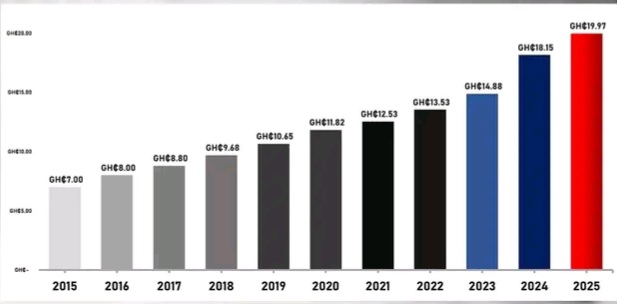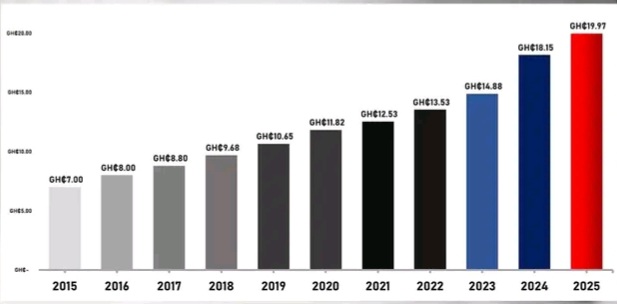By: Kenneth Appiah Bani.
The Ghanaian government has announced a 10% increase in the national daily minimum wage, moving it from GHS18.15 to GHS19.97. While this move is intended to support workers amid rising living costs, the key question remains: Will this increase make a meaningful difference in the lives of Ghanaian workers?
The Rising Cost of Living.
Ghana’s economy has faced significant challenges in recent years, with inflation remaining persistently high. According to recent reports, the inflation rate has hovered around 23-25%, significantly impacting the purchasing power of workers. Essential goods such as food, transportation, and housing have seen substantial price hikes.
For instance, the price of a bag of rice, which was around GHS300 in early 2023, has now risen to over GHS450. Transport fares have also increased due to fluctuating fuel prices, making commuting more expensive for workers. In such an economic climate, a 10% wage increase may not be enough to keep up with the rising cost of living.
Real Impact on Workers.
For many minimum-wage workers, this increment translates to an additional GHS1.82 per day, or roughly GHS54 per month. While any increase is welcome, the reality is that this amount does little to cover the rising expenses of an average household.
Consider a worker who earns the minimum wage and spends on food, rent, transportation, and utilities. If rent alone takes up 40-50% of their earnings, and food prices continue to rise, the wage increment will barely make a dent in their overall expenses.
The Business Perspective.
On the other hand, some businesses, especially small and medium-sized enterprises (SMEs), may struggle to absorb the higher wage costs. With economic pressures already affecting business operations, some employers may find it difficult to implement the new wages without adjusting their workforce or increasing prices, which could contribute to further inflation.
What More Can Be Done?
While the wage increase is a step in the right direction, experts argue that more comprehensive measures are needed to improve workers’ welfare. Some key recommendations include:
- Stronger Inflation Control Measures: The government must work towards stabilizing inflation to ensure that wage increases have real purchasing power.
- Tax Relief for Low-Income Earners: Reducing taxes on essential goods and services could help workers manage their daily expenses.
- Improved Public Services: Investing in affordable housing, transportation, and healthcare can ease the financial burden on workers.
- Skills Development and Job Creation: Expanding vocational training and creating better-paying jobs can provide workers with sustainable income growth.
In Conclusion the 10% increase in Ghana’s minimum wage is a positive move, but its effectiveness is questionable in the face of rising costs. Without further interventions to address inflation and economic stability, many workers may still find it difficult to make ends meet. The government must go beyond wage adjustments and implement broader policies that enhance the overall economic well-being of its citizens.
Is the new minimum wage enough? Share your thoughts in the comments.







